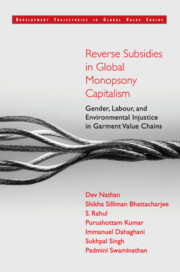Crossref Citations
This Book has been
cited by the following publications. This list is generated based on data provided by Crossref.
Nathan, Dev
2021.
From Monopoly to Monopsony Capitalism.
The Indian Journal of Labour Economics,
Vol. 64,
Issue. 4,
p.
843.
Silliman Bhattacharjee, Shikha
2022.
Migrant Labor Supply Chains: Architectures of Mobile Assemblages.
Social & Legal Studies,
Vol. 31,
Issue. 6,
p.
807.
Nathan, Dev
Kelkar, Govind
and
Govindnathan, Pallavi
2022.
Knowledge economy and gender inequality.
Gender, Technology and Development,
Vol. 26,
Issue. 3,
p.
341.
Paul, Bino
Shaji, Rahul
Patnaik, Unmesh
Pulikkamath, Ashraf
Ahmed, Irfan
and
Ghosh, Soumen
2023.
Transition to sustainable development in the tanning industry: Evidence from leather value chain in Tamil Nadu, India.
Sustainable Development,
Vol. 31,
Issue. 4,
p.
2938.
Nathan, Dev
Rahul S.
and
Kelkar, Govind
2023.
After the Long Walk Home…the Gendered Rural Safety Net.
Agrarian South: Journal of Political Economy: A triannual Journal of Agrarian South Network and CARES,
Vol. 12,
Issue. 2,
p.
227.
Silliman Bhattacharjee, Shikha
2023.
Zones of compounded informality: Migrants in the megacity.
PoLAR: Political and Legal Anthropology Review,
Vol. 46,
Issue. 2,
p.
226.
Bair, Jennifer
and
Mahutga, Matthew C
2023.
Power, governance and distributional skew in global value chains: Exchange theoretic and exogenous factors.
Global Networks,
Vol. 23,
Issue. 4,
p.
814.
Fernandes, Marianna
Lupo, Luisa
Benya, Asanda
Dedeoğlu, Saniye
Mezzadri, Alessandra
and
Prügl, Elisabeth
2023.
Social reproduction, women’s labour and systems of life: A conversation.
Dialogues in Human Geography,
Vol. 13,
Issue. 3,
p.
473.
Nathan, Dev
2024.
Knowledge and Global Inequality Since 1800.
Walters, David
James, Philip
and
Johnstone, Richard
2024.
Effects of economic drivers on work health and safety in global supply chains: A discussion of the effectiveness of regulatory strategies and their economic contexts.
The Economic and Labour Relations Review,
Vol. 35,
Issue. 3,
p.
556.
FUDGE, Judy
and
LEBARON, Genevieve
2024.
Regulatory design and interactions in worker‐driven social responsibility initiatives: The Dindigul Agreement.
International Labour Review,
Vol. 163,
Issue. 4,
p.
575.
FUDGE, Judy
and
LEBARON, Genevieve
2024.
Responsabilité sociale fondée sur les travailleurs: caractéristiques et interactions à la lumière de l'Accord de Dindigul.
Revue internationale du Travail,
Vol. 163,
Issue. 4,
p.
631.
Mezzadri, Alessandra
2024.
Value theories in motion: Circular labour migration, unfinished land dispossession and reproductive struggles across the urban–rural divide.
Environment and Planning F,
Silliman Bhattacharjee, Shikha
2024.
Contesting Caste: Institutionalized Oppression and Circumventive Legal Resistance.
Law & Social Inquiry,
p.
1.
Nathan, Dev
Rahul, S.
Bhatia, Lakshmi
Chakravarthi, Rekha
and
Ravi, Pradeepan
2024.
Global Monopsony, Contracting Practices and Labour Outcomes: A Study of Garment GVCs in India.
The Indian Journal of Labour Economics,
Vol. 67,
Issue. 4,
p.
993.
FUDGE, Judy
and
LEBARON, Genevieve
2024.
Diseño regulatorio e interacciones de gobernanza en la responsabilidad social impulsada por los trabajadores. Acuerdo de Dindigul.
Revista Internacional del Trabajo,
Vol. 143,
Issue. 4,
p.
627.
Marslev, Kristoffer
and
Whitfield, Lindsay
2025.
Why do labor regimes change? Worker power, the supplier squeeze, and structural transformation in the global apparel industry.
Journal of Economic Geography,



